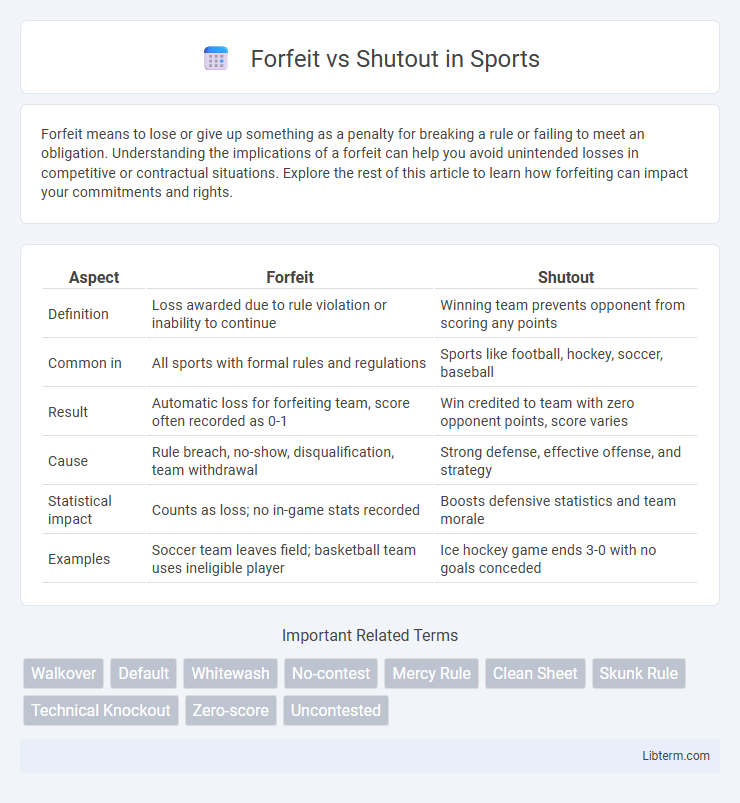Forfeit means to lose or give up something as a penalty for breaking a rule or failing to meet an obligation. Understanding the implications of a forfeit can help you avoid unintended losses in competitive or contractual situations. Explore the rest of this article to learn how forfeiting can impact your commitments and rights.
Table of Comparison
| Aspect | Forfeit | Shutout |
|---|---|---|
| Definition | Loss awarded due to rule violation or inability to continue | Winning team prevents opponent from scoring any points |
| Common in | All sports with formal rules and regulations | Sports like football, hockey, soccer, baseball |
| Result | Automatic loss for forfeiting team, score often recorded as 0-1 | Win credited to team with zero opponent points, score varies |
| Cause | Rule breach, no-show, disqualification, team withdrawal | Strong defense, effective offense, and strategy |
| Statistical impact | Counts as loss; no in-game stats recorded | Boosts defensive statistics and team morale |
| Examples | Soccer team leaves field; basketball team uses ineligible player | Ice hockey game ends 3-0 with no goals conceded |
Understanding Forfeit vs Shutout: Key Differences
Forfeit occurs when a team voluntarily concedes a game due to inability or refusal to continue, resulting in an automatic loss, while a shutout is a defensive achievement where one team prevents the opponent from scoring any points throughout the game. Forfeits affect team records and standings immediately, whereas shutouts emphasize defensive dominance and can boost team morale and statistical rankings. Key differences lie in intent and outcome: forfeits signify surrender or rule violation, whereas shutouts demonstrate superior gameplay performance.
Defining Forfeit in Sports
A forfeit in sports occurs when a team is disqualified or voluntarily surrenders a match, typically due to rule violations or failure to appear. Unlike a shutout, which is securing a victory by preventing the opponent from scoring, a forfeit results in an automatic win for the opposing team without actual gameplay. Forfeits impact league standings and can lead to penalties or fines as defined by the governing sports bodies.
What Constitutes a Shutout?
A shutout occurs when a team prevents their opponent from scoring any points throughout the entire game, demonstrating complete defensive dominance. It is officially recorded when the opposing team ends the match with a zero score, emphasizing the winning team's ability to maintain a flawless defense. Unlike a forfeit, which results from one team failing to appear or abide by rules, a shutout reflects a competitive game outcome determined by performance.
Reasons Teams Forfeit Matches
Teams forfeit matches primarily due to factors such as inadequate player availability, breaches of league rules, or inability to meet scheduling requirements. Forfeitures often result from disqualifications linked to ineligible players, financial constraints, or unforeseen circumstances like travel issues. Unlike shutouts, which are determined by game performance leading to a zero score, forfeits are administrative decisions leading to automatic losses.
How Shutouts Occur in Different Sports
Shutouts occur in sports when one team prevents the opposing team from scoring any points or goals, a common outcome in soccer, hockey, and baseball. In soccer and hockey, shutouts are recorded when the goalkeeper or goalie successfully defends all scoring attempts, while in baseball, a pitcher achieves a shutout by completing the entire game without allowing a run. These defensive accomplishments highlight a team's dominance and strategic effectiveness during the game, differing significantly from a forfeit, which is an automatic loss without gameplay.
Impact of Forfeits on Team Rankings
Forfeits directly affect team rankings by awarding automatic wins to the opposing teams, often distorting the true competitive balance of the league. These outcomes can lead to inflated records that do not reflect actual on-field performance, impacting playoff seedings and statistical analyses. Shutouts, by contrast, are earned results that reflect dominant defensive play without artificially altering team standings or league fairness.
Shutouts: A Marker of Defensive Excellence
Shutouts serve as a critical indicator of defensive prowess in sports, showcasing a team's ability to prevent the opponent from scoring throughout the entire game. Achieving a shutout requires consistent coordination between the defense and goalkeeping units, reflecting superior strategic execution and physical resilience. Teams with high shutout counts often dominate their leagues, emphasizing the importance of defensive strength in securing victories and championship titles.
Forfeit vs Shutout: Implications for Players
Forfeit results in an automatic loss when a player or team is unable or unwilling to continue, impacting ranking points and future tournament eligibility. Shutout occurs when one player or team prevents the opponent from scoring any points, boosting confidence and demonstrating dominance while retaining official competition outcomes. Forfeits can carry penalties and affect player reputation negatively, whereas shutouts reinforce skill and strategic superiority without administrative consequences.
Famous Sports Forfeits and Shutouts
Famous sports forfeits include the 1919 Black Sox Scandal where the Chicago White Sox forfeited their World Series games due to throwing matches, and the 1975 Rugby Union match when Fiji forfeited against England over a jersey color dispute. Notable shutouts feature the 2018 FIFA World Cup match where Belgium defeated Panama 3-0 with a complete defensive shutout and the 1966 NFL Championship game where the Green Bay Packers shut out the Dallas Cowboys 34-0. Forfeits often result from disputes or violations, whereas shutouts highlight dominant team defense and scoring control during the game.
Forfeit or Shutout: Which is More Controversial?
Forfeit and shutout both result in a definitive game outcome, but forfeit is generally more controversial due to the circumstances leading to an automatic loss, such as rule violations or player misconduct. Shutouts, achieved through superior defensive play with the opposing team failing to score, are widely accepted as part of competitive sports. Controversy arises in forfeits because they often involve external disputes or penalties rather than on-field performance.
Forfeit Infographic

 libterm.com
libterm.com